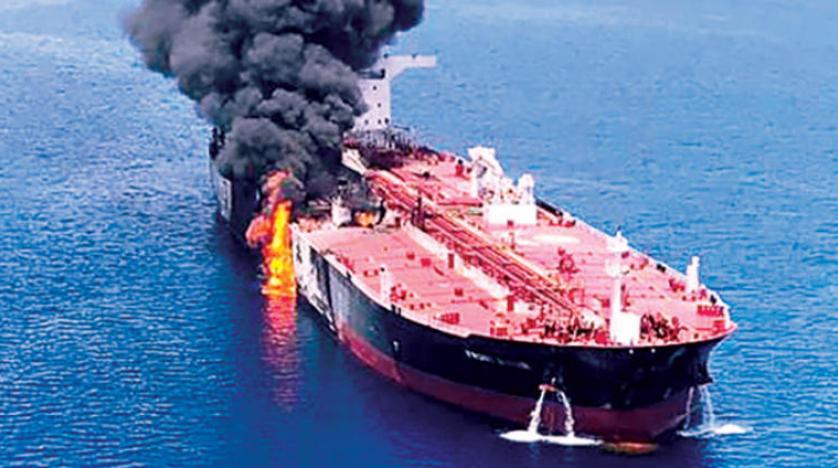Analysis/Oman Attack: Iran Is the Immediate, but Unlikely, Suspect
تعليق من الهآرتس للمحليل السياسي زفي برئيل يتناول الإتهامات الفورية لإيران بضرب ناقلات النفط في خليج عمان وما رافق الإتهام من احتمالات أخرى مختلفة
Zvi Bar’el/Haaretz/June 14/2019
U.S. officials rushed to point to Tehran, but somehow the world’s leading intelligence services failed to discover who is actually behind the strike.
And even if they knew, what could be done without risking all-out war?
A unnamed senior U.S. Defense Department official was quick to tell CBS that Iran was “apparently” behind the Thursday attack on two oil tankers in the Gulf of Oman, followed by State Secretary Mike Pompeo who later told reported that it was his government’s assessment. There’s nothing new about that, but neither is it a decisive proof.
Who, then, struck the tankers? Whom does this strike serve and what can be done against such attacks?
In all previous attacks in the Gulf in recent weeks Iran was naturally taken to be the immediate suspect. After all, Iran had threatened that if it could now sell its oil in the Gulf, other countries would not be able to ship oil through it; Tehran threatened to block the Strait of Hormuz, and in any case it’s in the sights of the United States, Saudi Arabia and Israel. But this explanation is too easy.
The Iranian regime is in the thrones of a major diplomatic struggle to persuade Europe and its allies, Russia and China, not to take the path of pulling out of the 2015 nuclear agreement. At the same time, Iran is sure that the United States is only looking for an excuse to attack it. Any violent initiative on Tehran’s part could only make things worse and bring it close to a military conflict, which it must avoid.
Iran has announced it would scale back its commitments under the nuclear deal by expanding its low-level uranium enrichment and not transferring the remainder of its enriched uranium and heavy water to another country, as the agreement requires. The International Atomic Energy Agency’s reports reveal that it has indeed stepped up enrichment, but not in a way that could support a military nuclear program.
It seems that alongside its diplomatic efforts, Iran prefers to threaten to harm the nuclear deal itself, responding to Washington with the same token, rather than escalate the situation to a military clash.
Other possible suspects are the Iran-backed Houthi rebels in Yemen, who continue to pound Saudi targets with medium-range missiles, as was the case last week with strikes on the Abha and Jizan airports, near the Yemeni border, which wounded 26 people. The Houthis have also fired missiles at Riyadh and hit targets in the Gulf. In response, Saudi Arabia launched a massive missile strike on Houthi-controlled areas in northern Yemen.
The strike on the oil tankers may have been a response to the response, but if this is the case, it goes against Iran’s policy, which seeks to neutralize any pretexts for a military clash in the Gulf. The question, therefore, is whether Iran has full control over all the actions the Houthis take, and whether the aid it gives them commits them fully to its policies, or whether they see assaults on Saudi targets as a separate, local battle, cut off from Iran’s considerations.
The Houthis have claimed responsibility for some of their actions in Saudi territory in the past, and at times even took the trouble of explaining the reasons behind this assault or the other. But not this time.
Yemen also hosts large Al-Qaida cells and Islamic State outposts, with both groups having a running account with Saudi Arabia and apparently the capabilities to carry out strikes on vessels moving through the Gulf.
In the absence of confirmed and reliable information on the source of the fire, we may meanwhile discount the possibility of a Saudi or American provocation at which Iran has hinted, but such things have happened before. However, we may also wonder why some of the most sophisticated intelligence services in the world are having so much trouble discovering who actually carried out these attacks.
Thwarting such attacks with no precise intelligence is an almost impossible task, but even if the identity of those responsible for it is known, the question of how to respond to the threat would still arise.
If it turns out that Iran initiated or even carried out these attacks, American and Saudi military forces could attack its Revolutionary Guards’ marine bases along the Gulf coast, block Iranian shipping in the Gulf and persuade European countries to withdraw from the nuclear deal, claiming that continuing relations with Iran would mean supporting terrorism in general, and maritime terrorism in particular.
The concern is that such a military response would lead Iran to escalate its own and openly strike American and Saudi targets in the name of self-defense and protecting its sovereignty. In that case, a large-scale war would be inevitable. But there’s no certainty that U.S. President Donald Trump, who wants to extricate his forces from military involvement in the Middle East, truly seeks such a conflict, which could suck more and more American forces into this sensitive arena.
An escape route from this scenario would require intensive mediation efforts between Iran and the United States, but therein lies one major difficulty – finding an authoritative mediator that could pressure both parties. Russia or China are not suitable candidates, and ties between Washington and the European Union are acrimonious.
Supporters of the Houthi movement attend a rally to mark the 4th anniversary of the Saudi-led military intervention in Yemen’s war, Sanaa, Yemen, March 26, 2019.
It seems that all sides would be satisfied if they could place responsibility for the attacks on the Houthis or other terror groups. That is not to say that the United States or Saudi Arabia have any magic solutions when it comes to the Houthis; far from it. The war in Yemen has been going on for five years now with no military resolution, and increased bombardment of concentrations of Houthi forces could only expand their efforts to show their strength. But the United States would pay none of the diplomatic or military price for assaults on the Houthis it would for a forceful violent response against Iran itself.
If sporadic, small-scale attacks raise such complex dilemmas, one can perhaps dream of an all-out war with Iran, but it is enough to look at the chaos in Iraq and Afghanistan to grow extremely cautious of the trajectory in which such dreams become a nightmare that lasts for decades.























